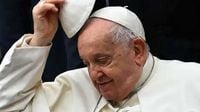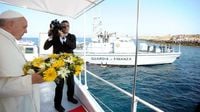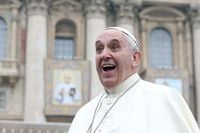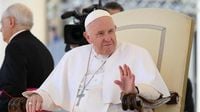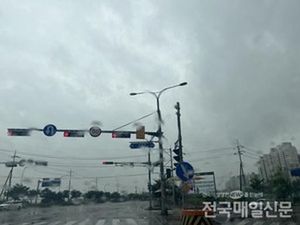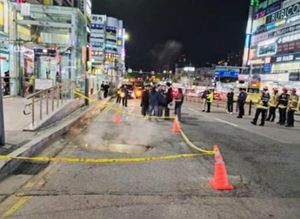Pope Francis, the first Jesuit Pope and the first from Latin America, passed away on Monday morning, April 21, 2025, at the age of 76. His death has prompted a global outpouring of grief and tributes from leaders and citizens alike, reflecting on his significant impact on the Catholic Church and the world at large.
In a heartfelt message on X, Karin Keller-Sutter, President of the Confederation, honored the Pope as "a great spiritual leader, an tireless advocate for peace, and his warmth was a comfort not only for Catholics." She added, "Pope Francis has left us. His legacy will remain." Similarly, Israeli President Isaac Herzog described him as "a man of deep faith and endless compassion," emphasizing his commitment to strengthening ties with the Jewish community and promoting interfaith dialogue.
King Charles III expressed being "very deeply saddened" by the news, noting that the Pope served the world with "devotion throughout his life." He found some solace in the fact that Francis was able to share an Easter message with the Church and the world just a day before his death. The King, who visited the Pope at the Vatican on April 9, 2025, conveyed his sorrow alongside a message of respect.
British Prime Minister Keir Starmer also paid tribute, stating on X that Francis's "tireless efforts for a fairer world will leave a lasting legacy." The British government announced that flags would be flown at half-mast on its buildings until Tuesday evening, April 22, 2025, in remembrance of the Pope.
The Swiss Guard expressed their grief, stating, "It is with deep sadness that the Pontifical Swiss Guard bids farewell to Pope Francis. We remember with gratitude and prayer his papacy marked by humility and courage." Ursula von der Leyen, President of the European Commission, praised his "humility and pure love for the most destitute," while French President Emmanuel Macron extended his "sincere condolences to Catholics worldwide," highlighting Francis's lifelong dedication to justice for the vulnerable.
Macron, who met with the Pope in June 2024, emphasized the shared pain felt in France and around the globe following the announcement of his death. He remarked on the Pope's unwavering commitment to those in need, stating, "He always stood by the most vulnerable and fragile."
François Bayrou, a key French political figure, described the Pope's approach as "historic," noting his desire for the Church to stand alongside the poor and marginalized. Bayrou reflected on how Francis's actions represented a significant shift within the Church.
As a mark of respect, the Eiffel Tower was to be extinguished on the evening of April 21, 2025, in tribute to the Pope. Ukrainian President Volodymyr Zelensky also honored the Pope, recalling his prayers for peace in Ukraine amidst ongoing conflict, stating, "He gave hope and alleviated suffering through prayer and promoted unity. We are saddened with Catholics and all Christians."
The Iranian government, which maintains cordial relations with the Vatican, expressed its condolences, with spokesperson Esmaïl Baghaï stating, "I offer my condolences to all Christians around the world," and prayed for the Pope's peace. Spanish Prime Minister Pedro Sánchez lamented the Pope's passing, praising his commitment to peace and social justice.
Italian Prime Minister Giorgia Meloni called him "a great man who leaves us," while Irish Prime Minister Micheál Martin described him as a defender of the "poor" and "oppressed." U.S. Vice President JD Vance, who had an audience with the Pope just a day before his death, shared his thoughts with "the millions of Christians who loved him."
The White House issued a statement saying, "May he rest in peace," while Egyptian President Abdel Fattah al-Sissi remarked that the Pope was "a voice of peace, love, and compassion." Ethiopian Prime Minister Ably Ahmed honored his "legacy of compassion and humility," and Indian Prime Minister Narendra Modi noted that millions would remember the Pope as a model of compassion, humility, and spiritual courage.
Lebanon mourned the loss of a "dear friend," while German Chancellor Olaf Scholz commended him as a "defender of the weakest" and a "man of reconciliation." Palestinian President Mahmoud Abbas expressed his gratitude for the Pope's friendship with the Palestinian people, and Kenyan President William Ruto acknowledged his unwavering commitment to inclusion and justice.
Christine Lagarde, President of the European Central Bank, remarked on the Pope's role as a "global voice for unity, justice, and human dignity." Polish Prime Minister Donald Tusk described him as a "good, warm, and sensitive man," while Portuguese Prime Minister Luís Montenegro recognized his "unique legacy." Russian President Vladimir Putin called him a "defender" of humanism and justice, recalling their dialogues on various issues.
Hungarian Prime Minister Viktor Orbán simply stated, "Thank you for everything and goodbye," while Turkish President Recep Tayyip Erdogan referred to him as a "respected statesman" who valued dialogue between different religious groups. Argentine President Javier Milei praised the Pope's "goodness" and "wisdom," despite some differences in opinion.
Nobel Peace Prize laureate Muhammad Yunus, now leading the provisional government in Bangladesh, referred to the Pope as a "true friend and soulmate," highlighting his humility and compassion. As the world reflects on the life and legacy of Pope Francis, it becomes clear that his influence extended far beyond the confines of the Vatican, touching lives across continents and cultures.
Throughout his papacy, which began on March 13, 2013, Pope Francis was known for his commitment to social justice, interfaith dialogue, and environmental issues. He was the first Pope to reside outside the Apostolic Palace, opting for a modest room in the Sainte-Marthe residence, and he consistently emphasized the need for the Church to serve the poor and marginalized.
His first official trip was to Lampedusa, where he paid tribute to migrants who lost their lives at sea, a gesture that set the tone for his papacy focused on compassion and outreach. He convened a synod on family issues, advocating for the inclusion of divorced individuals in the Church, and he was a vocal advocate for environmental protection, famously issuing the encyclical "Laudato si'" in 2015.
Pope Francis's legacy is marked by his efforts to reform the Church, promote social justice, and foster dialogue among different faiths. He leaves behind a world that has been profoundly influenced by his message of love, compassion, and the call to serve those in need.
